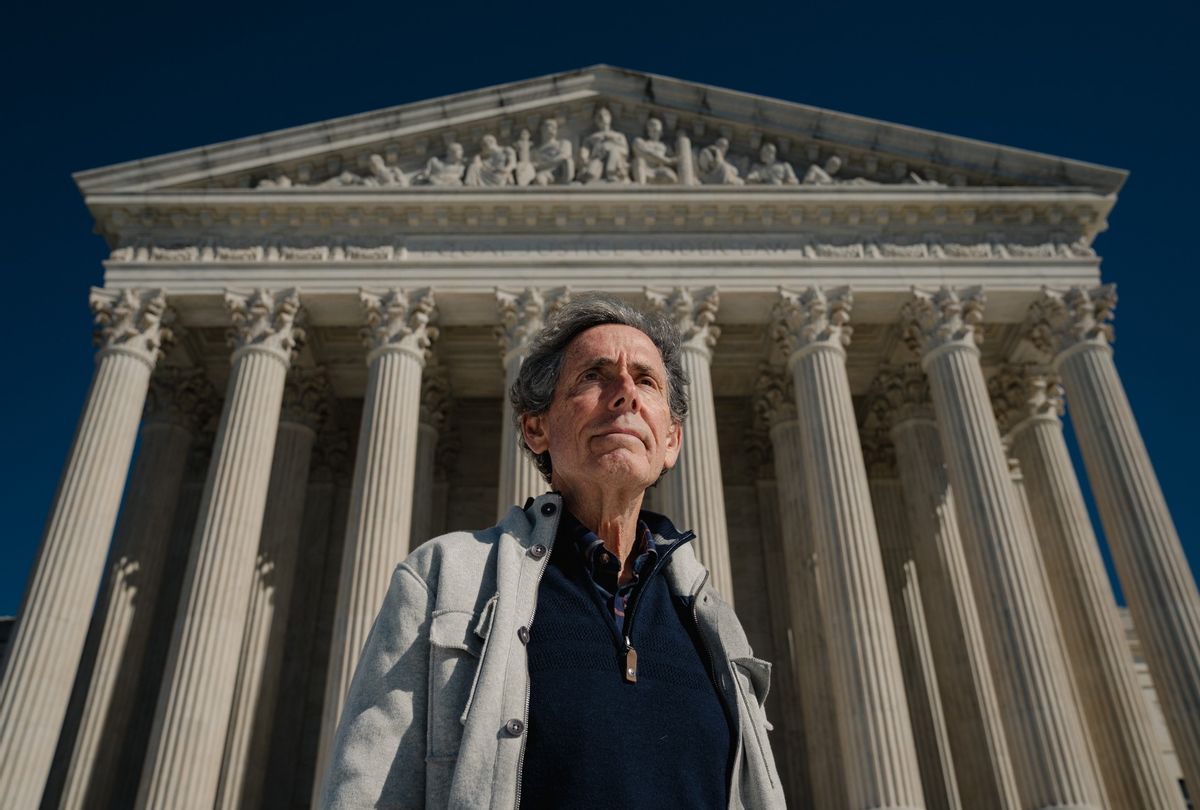Notorious conservative activist’s lawsuit threatens grant program for Black women amid anti-DEI push

The same conservative activist that led the legal push behind last summer’s Supreme Court takedown of race-based college admissions has set his sights on the corporate sector, now challenging the legality of a grant intended to support Black businesswomen’s ventures.
Edward Blum’s American Alliance for Equal Rights filed a complaint against venture capital firm Fearless Fund in early August, accusing the Black-women-founded group of discriminating against other races in offering a grant program solely to Black businesswomen.
The lawsuit, currently being considered in a federal appeals court which held oral arguments in the case last week, is a symbol of an active conservative legal assault — bolstered, in part, by the Supreme Court’s June decision — on DEI and race-consciousness in a number of venues, the most recent being private businesses. The case, alongside a spate of others like it, is poised to spark a nationwide reckoning with corporate DEI policies, spurring other challenges that could ultimately upend a swath of efforts meant to assuage racial and ethnic disparities.
The Alliance and other organizations filing similar lawsuits “see an opening because of the Supreme Court’s decision,” Olatunde Johnson, the Ruth Bader Ginsburg ’59 Professor of Law for Columbia Law School, told Salon, noting that these groups are taking on employment programs, corporate DEI programs and other initiatives like the Fearless Fund.
These sorts of cases will likely test the ability of public and private employers to address discrimination and take affirmative steps to address the disparity it causes, Johnson explained.
“We do expect over the years to come — not immediately — that we’re really going to respond to the question of whether or not corporate DEI programs, fellowship programs and other affirmative efforts to address racial inequality are permissible,” added Johnson, who specializes in constitutional and anti-discrimination law.
At issue in the Fearless Fund case is the firm’s Strivers Grant Contest, which awards $20,000 to Black women seeking funding to boost their small businesses, according to The Associated Press. In order to be eligible for the program, the business must be at least 51 percent owned by Black women, revenue-generating (with a $50,000 minimum revenue “strongly preferred”) and formed and operated under U.S. law, a 2023 webpage for the contest described.
The Alliance filed the suit on behalf of three of its members — anonymous businesswomen whom the Atlanta Journal-Constitution reported included white and Asian women — who it said felt they incurred personal harm by being deemed ineligible to receive the grant solely based on their racial identities. The lawsuit did not identify the women, referring to them only as Owner A, Owner B and Owner C.
The Alliance argues that “entry in the program forms a contractual relationship between Fearless Fund and the applicant” with the applicant agreeing to the official eligibility requirements — what the Alliance considers the contract — through their application.
“Under that contract, the applicant obtains a chance at $20,000,” the original lawsuit reads. “In exchange, Fearless Fund obtains, among other things, the right to use information about the applicant for publicity and to use the ideas in the application without further compensation.”
The conservative organization hinges its claim on section 1981 of the 1866 Civil Rights Act, a Civil War-era law intended to protect formerly enslaved Americans from discrimination. The law provided equal rights and benefits to all citizens of the U.S. as “enjoyed by white citizens” to “make and enforce contracts” among other legal maneuvers.
The Alliance and other anti-DEI entities in their own suits argue that the provision means race can’t be taken into account in contracts at all.
“The common theme shared by all of these lawsuits is the challenge to race-based factors in corporate, governmental, cultural and academic endeavors,” Blum told the Wall Street Journal. “All of the lawsuits are attempting to eliminate race as a factor in these programs and policies.”
That argument, however, contradicts the original intent and historical context of the law they cite, according to Margaret Russell, a Santa Clara University professor of law, specializing in civil rights and constitutional law.
“If you take into account that section 1981 was really intended to prohibit discrimination on the basis of race, color and ethnicity when making and enforcing contracts and ensure that individuals have the same rights and benefits as quote ‘enjoyed by white citizens,’ that is not a flat out rule that you don’t take race into account,” Russell said. “It is very much rooted in time periods.”
Fearless Fund also rejects the claim, arguing that the program constitutes a charitable donation and is considered a form of protected expression under the First Amendment. The firm cites as support the Supreme Court’s 303 Creative v. Elenis ruling from last June that saw the justices establish an evangelical, Colorado web designer’s right to refuse hypothetical commissions for same-sex wedding websites under the First Amendment on the grounds that she should not be forced to produce speech she disagrees with.
By that logic, lawyers for Fearless Fund argue, the firm can’t be made to adhere to a “colorblind-at-all-costs viewpoint” it disagrees with, according to The Wall Street Journal.
“We are solving the disparities that exist,” chief executive and co-founder Arian Simone told the outlet. “It’s very disheartening, the moment we are in right now, to see the economic progress due to the racial reckoning of 2020 and seeing where we are four years later.”
A 2019 Harvard University Kennedy School Women and Public Policy Program report found that women received a slim 2.4 percent share of the billions of dollars in venture capital funding. While 2020 marked a year of growth in the amount of money invested in Black women’s companies, just 0.34 percent of venture capital firm investments went to companies with them at the helm, according to Crunchbase, which analyzes venture capital data.
Through its Strivers Grant Contest, which is currently paused, the firm endeavored to bridge that gap between the overwhelming majority of venture capital funding that goes to white men and the dismal margin that ends up in the hands of Black women business owners.
“Honestly, I actually have the same belief as the plaintiff,” Simone told a reporter, in part, following last Wednesday’s hearing, according to a clip shared on her Instagram. “I would like a world that race-based things do not matter. But guess what? We live in America, and there are disparities that have to be solved for for us to get to that point.”
Attorneys for Fearless Fund navigated tough questioning from the three-judge panel of the 11th Circuit Court of Appeals in Miami, composed of two Trump appointees and an Obama appointee, about the legality of the firm’s grant program under the First Amendment and whether its exclusive support of Black women amounts to racial discrimination, according to the Atlanta Journal-Constitution.
Broadly speaking, current law permits efforts like the Fearless Fund as long as they are “remedying past or contemporary discrimination if there is a basis that’s established … for determining that there is past or present discrimination,” Johnson said. “Whether any particular case rises or falls depends on whether they can prove that in their sector, whether that informed the design of their program, whether or not they tried other efforts.”
Want a daily wrap-up of all the news and commentary Salon has to offer? Subscribe to our morning newsletter, Crash Course.
Fearless Fund sought a reversal of the October preliminary injunction suspending the operation of their grant program through the duration of the lawsuit. The foundation asked the court to rule in line with the U.S. District Court for the Northern District of Georgia’s September decision that found it “clearly intends to convey a particular message in promoting and operating its grant program: ‘Black women-owned businesses are vital to our economy.’… The Foundation’s conduct at issue is, therefore, expressive and subject to the First Amendment,” per the Journal-Constitution.
The Alliance had appealed the ruling and an injunction was granted by an 11th Circuit panel days later. A decision on Fearless Fund’s appeal following last week’s hearing is still pending. The way the case is playing out in the lower courts signals it’s likely to wind up before the Supreme Court, Russell told Salon.
The Supreme Court’s emboldening ruling against affirmative action policies in college admissions determined that those programs were in violation of the Equal Protection Clause of the Constitution and arose from two cases brought against Harvard University and the University of North Carolina by Students for Fair Admissions, another non-profit led by Blum.
Though the decision did not apply to corporations or their DEI policies, it did open the door for a slew of additional challenges to racial preferences in other sectors to take hold amid the number of them that had already been filed against corporations in recent years.
“It’s really tragic that the Supreme Court ruled the way that it did in the affirmative action cases, both for public and private institutions, Russell told Salon, noting that “measures of racial equality and equity have happened really only since institutions of higher education opened their doors.”
“Ignoring that history of discrimination is, I think, at best it’s disingenuous. It’s trying to reinforce existing inequities,” she added, arguing that the ruling also illustrates the extent of conservative thought’s shift farther to the right from the era of Republican President Richard Nixon, who authorized early affirmative action programs.
According to Time, the volume of anti-affirmative action cases has vaulted since the Supreme Court determination with some minority- and woman-targeted business resources being hit with suits of their own; others have removed specific mention of DEI initiatives and policies from their websites to avoid legal trouble.
Three major law firms sued by the Alliance over fellowship programs for students of color, particularly those from underrepresented demographics in the field, expanded their programs to all students, prompting the alliance to drop the suits, Time noted.
The groups behind these suits are “ignoring” the baseline conditions of racial and gender discrimination in various sectors, Johnson argued.
“I think that these cases — and they’re successful at doing so, no doubt, because they attract a lot of attention from media and other resources — they focus attention on the discriminatory point as being [what is actually] the remedy for discrimination,” Johnson told Salon. “And I would like to see more attention paid to what are the barriers, how do we address those barriers, including by the groups that bring these suits.”
Johnson expects to see a spike in legal challenges to race-conscious programs or efforts to address racial inequality over the next few years that will result in an array of appellate rulings — and possibly a Supreme Court decision — and determine the scope of section 1981 and Title VII to address racial inequality and past or present discrimination.
“Fearless Fund is really just the tip of the iceberg,” Russell said, adding that these “challenges are not just legal challenges. They are very much rhetorical challenges to try to change public perceptions of what racial equality means.”
“If I were writing about this I would want to know, why is this the goal of these organizations? What kind of America do they want to see at the end? Who’s financing them?” Johnson added, “because they adopt a very zero-sum view of economic prosperity in this country, and I think ultimately, that’s a dangerous thing. We have to think about how we’re going to design an inclusive democracy.”
Read more
about the right-wing anti-DEI crusade


